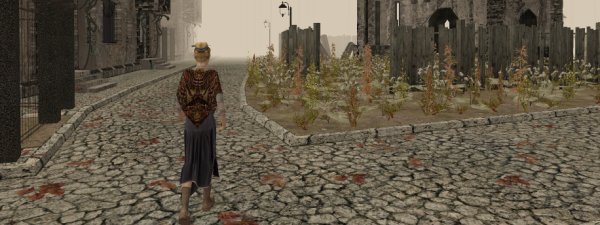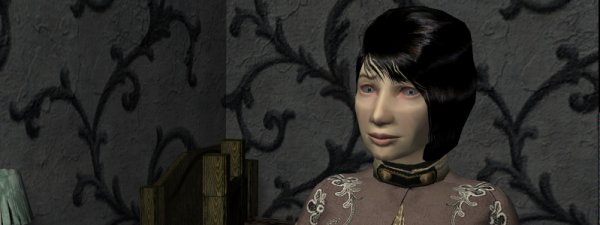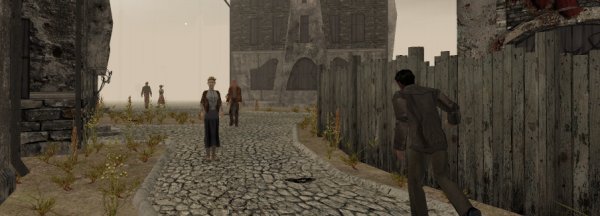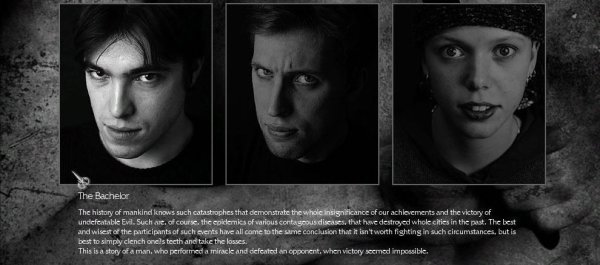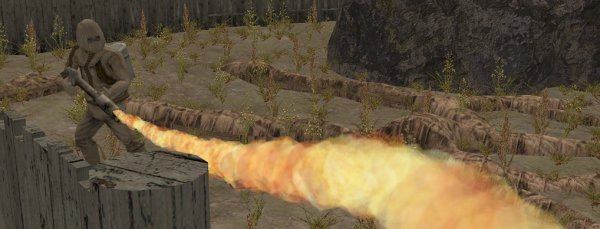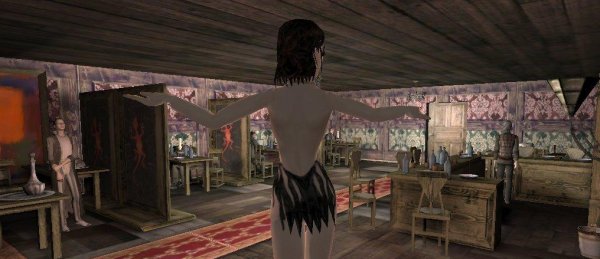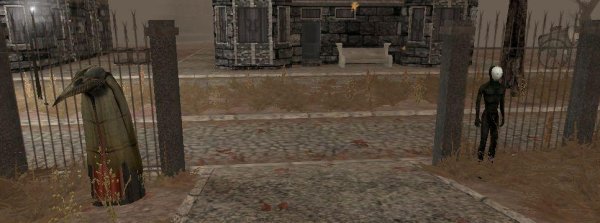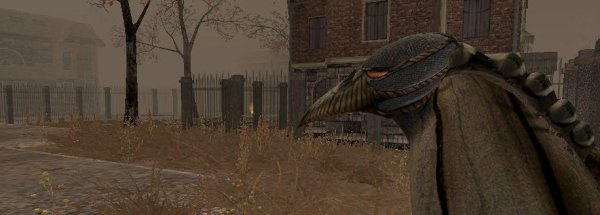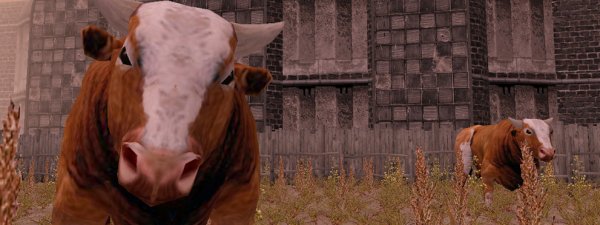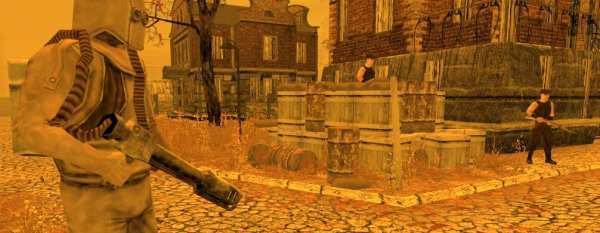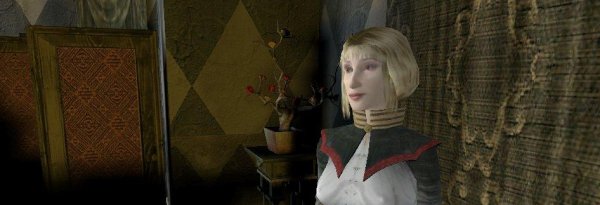Okay.
…okay.
I’m going to explain, right now, why a Russian FPS/RPG called Pathologic is the single best and most important game that you’ve never played.
This isn’t the first time I’ve tried, mind you. There are a half-dozen half-finished Word documents on my laptop, all of them abandoned at some point because I felt like I was failing to express myself. I mean, there’s a lot at stake here. My devotion to Pathologic is such that I’ve had a symbol from the game tattooed on my back, a big ol’ ugly thing that’s meaningless to anyone who hasn’t played the game. Far more significantly, Pathologic kept me closeted away in my room for tens of hours during University Fresher’s Week. Fresher’s Week! The one beautiful week in a boy’s life where seduction can be as simple as walking into a bar and SNEEZING on a girl.
But enough is enough. The more I procrastinate about writing this, the hazier my memory will be and the less I’ll do the game justice. So here I go.
This article will be in three parts. The first will outline the body of the game. The second part will touch on the mind, and we’ll finish with the soul.
Which is a bit pretentious, but it can’t be helped, as it’s the only way to show you what this game showed me. Chances are you only know how to take from games. Truth is, the real fun only starts when you let part of yourself be given away.
You ready? I’m not ready. Okay let’s do this.
Butchering Pathologic
Part I: The Body
Pathologic is a game about disease.
The game begins with three healers arriving in a town, a backwards settlement built on a meat industry out in the barren earth of the Russian steppes. The year is… about 1910, maybe. The three healers do not know each other, and arrive in town via different paths and come for different reasons. One of the healers is a dashing doctor from the city, another is a musclebound shamanistic figure. The last is a tiny girl with fearsome messianical powers. They are the Bachelor, the Haruspicus and the Devotress. They’re also your playable characters.
But things are wrong. The moment the three healers arrive a terrible, merciless infection breaks out. Soon thousands of residents have fallen ill, with hundreds more dying each day. As the town is isolated and, eventually, quarantined, the healers are trapped, forced to win the fight against the disease or succumb to the infection themselves. And make no mistake, if no one stops this plague it will wipe the town off the face of the Earth like so much rambling on a blackboard.
And that’s the set-up.
As much as this is already a stunningly unique basis for a game, Pathologic complicates things a little further.
First, the three characters do not work together. Each of them is given their own distinct narrative and has their own story to tell. As much as it’d make sense for them to pool their knowledge and resources, the atmosphere in the town is chaotic. Few people trust the Bachelor and his bizarre microscope, the Haruspicus starts the game wanted for a murder he didn’t commit (and later for murders he most definitely did), and no one can decide if the Devotress is an angel or a demon. Some people even think she is, in fact, two people. But we’re getting ahead of ourselves there.
So, each of the characters ends up making different alliances with different important figures, and each character gets different opportunities and jobs each day as a result. Each of them therefore sees a very different side of the story. The two characters you choose not to play are still present in your game, however, and go about their business and can be talked to if you get the chance.
Now this is interesting for a few reasons. To start with, it gives the game incredible freedom in which to tell its story, because it can now use narrative techniques which are normally off limits.
Kieron’s talked before about how Deus Ex is one of the few games ever to have characters who actually lie to you. Not huge, pantomime deceptions, but little half-truths and tricks delivered deadpan by those you consider to be your friends, sometimes there to trip you up and hurt you, sometimes there for no reason other than it makes sense in the context of the plot. Lies are difficult to employ as a developer because a game always needs closure, so you have to make sure the player walks away understanding who lied and why. It’s arguable that Deus Ex only had the sizeable balls required to try it because of its thickly conspiratorial setting.
By contrast, in Pathologic absolutely everybody has an angle, everyone’s bending the truth and trying to twist you round their fingers, and the developers can do this because they have two whole other narratives to explain why.
For example, as the Bachelor you might hear that meat baron Big Vlad is setting a trap for the Haruspicus, because the shaman was seen cutting open one of his cows last night. As the Haruspicus you’ll get thrown in jail and eventually escape, but you’ll never find out why you were imprisoned. That brings with it feelings of confusion, betrayal and dread.
And this is the other reason the tri-character narrative is interesting. It makes the world seem that much less contrived. In Pathologic people don’t always answer your questions, and mysteries go unsolved. This actually ties in with the central concept of disease, which is at its heart a battle against ignorance- once the disease is understood, it can be cured, after all. And just as it’s the combined and separated actions of the three characters that ultimately cure the disease (rather than any one of them saving the day) it’s only in completing the game three times that you’ll truly understand what’s going on.
(Not that you’ll ever have the tenacity to complete the game more than once. And not that that matters. More on that particular juicy contradiction in parts 2 and 3.)
So what we’ve got here is not only a game with a bizarre, intriguing plot, but one that guards that plot fiercely. It’s refreshing- more and more these days we’re seeing games sold on the time and money poured into their script. In Pathologic this ambitious, complex plot with dozens of uniquely human character is almost glossed over. Like Planescape: Torment the plot is just there, as if these games came from an alternate universe where sturdy stories were taken for granted in games.
Moving on, it’s not just the narrative architecture that toys with you, simultaneously beckoning you and pushing you away- the town’s architecture does it too.
As you’re scrambling from one location to the next there are a few buildings in which aren’t going to escape your attention. First, there’s the Abattoir. Visible on your map as a huge, tumour-like hill on an otherwise flat landscape, the Abattoir is where the town’s meat… comes from. A simple pulley system runs from out of a hole in the hill all the way to the train yard, loaded with hundreds of huge hemp sacks, all of them sticky with blood, sagging down near the ground on their way to the trains. But the Abattoir’s been shut down since the outbreak. The doors have been locked with the workers still inside, and the sacks of meat hanging off the pulley system are left rotting in mid-air.
Then there’s the Aviary. A terrifying monsterpiece of a building, the Aviary is a gargantuan rectangular concrete block with narrow vertical slits for windows. This is where the town keeps its inexplicably large population of madmen. It’s also where the town gets rid of most of its dead. Bodies are dumped into holes at the base of the Aviary, where they’re dragged away and somehow made use of by the Aviary’s inhabitants. Again, this building has been sealed off since the outbreak, the inhabitants still inside.
Finally on the other side of town you have the Polyhedron. Built by the town’s resident prodigal architect, the Polyhedron is a mammoth angular structure resembling an Escher-like interpretation of a conch seashell stuck into the ground by the pointy end. The physics of it are impossible. The town’s children have recently commandeered it, keeping the door locked to everyone except other children.
A lot of people are aware of the game design trick where you show the player something they can’t access at the beginning of the game, so it sticks in the back of their mind until eventually you grace them with the ability to go back and get it. These buildings in Pathologic take that idea and run with it, sprint with it, go skydiving with it. For most of the game these structures are brooding over you, their contents a dark mystery, and half of everything you learn about the town relates to them in some way.
For instance, you hear that the meat-men inside the Abattoir think of themselves as an animal brotherhood. And you hear that inmates have been wrenching themselves out of the Aviary’s windows, trying to escape something inside. You hear the smaller children of the Polyhedron have been sent out into the town to gather powders and pills for the big kids. These black rumours are endless, and the more you hear the more fascinating AND terrifying these buildings become. Yet as much as you don’t want to go inside them, the fact that you can’t enter them anyway makes them oh so intriguing. Ain’t human nature a bitch.
The kicker is that because of that three-character narrative it’s never even a sure thing that you’ll have the chance to go inside them. As far as your character’s concerned, each one might stay a mystery forever.
You’ve never felt foreboding like it. Any student of horror will tell you that there’s nothing more horrible than what only exists in the audience’ mind. Pathologic has you building up your own unthinkable mental picture of what takes place inside these buildings for almost the whole game.
And Christ, it’s a game that can back up its threats.
Pathologic has the cruelest survival mechanics I’ve ever encountered in a videogame. As well as taking care of your physical health, you’ve got to deal with hunger, thirst, exhaustion, infection and reputation.
But- and this is absolutely key- survival within Pathologic does not bend to you, just as the story doesn’t bend to you. This rigidity is perhaps what marks it out as a uniquely Russian videogame. Just as survival in real life is merely something you have to do in order to achieve your goals, so it is in Pathologic. You will not get paid money when you carry out the whims of the town’s leaders. There will not be a health pack hidden behind the thug. You will not find a loaf of bread at the back of the cave. You’ll find a stone wall at the back of the cave, because it’s a fucking cave.
Instead, survival is its own entirely separate entity. To keep up a stash of supplies you have to learn to master the town’s nightmare economy. Example: giving a child a cutthroat razor in exchange for stolen jewelery, trading these jewels in at a grocers for a heel of bread. Another example: recovering empty bottles from bins, filling them with water at the well and giving them to hungover drunks in exchange for bandages.
On my first runthrough of the game I was impossibly relieved when I got given a revolver and six bullets, because it was the solution to my impending starvation. I took it straight to the nearest corner store and swapped it for a bottle of milk and a can of vegetables. The next day food doubled in price.
I don’t want to dwell on the survival, but the brilliance of this cannot be overstated. If there’s another FPS this decade that has you eagerly swapping your only gun for milk, I’ll gladly disappear up my own asshole.
So the structure of Pathologic has you playing two separate games. Carrying out the jobs, missions and inquiries that may or may not help you fight the disease, and simply surviving.
What pushes this combination to fever pitch is a few things. First, the survival is hard. It’s easy to get yourself into a situation where poverty or disease will be the end of you, and if you fail to buy more and more serious weaponry and protective clothing (both of which degrade with use anyway) as the town’s situation becomes more dire, then you might find that the only way out is restarting the game. This means that survival can never truly leave your mind. Your own safety can never be an afterthought. Second, you’re working under a time limit. Every day brings its own deaths, problems, occurrences and tasks, and plot threads vanish as the next day begins. There’s always the option to trade some of your equipment for coffee beans and chew your way through the night, but (just like in real life!) it’s never a good idea.
BUT, and this is another one of those individual aspects of Pathologic which makes me want to scream from the rooftops, if you leave a day’s missions unfinished the game keeps going. You could easily spend a day just stockpiling equipment, but then the survival of the town slips that much further through your fingers.
If you think all this sounds Hellish, you’re dead right. If you think this doesn’t sound fun… you might be right. Certainly there’s a lot here that’s interesting, but you might be doubtful as to whether it makes a good game.
What you have to realise is that, disparate and cruel as all these game mechanics are, they’re all pulling in the same direction. They try and foster something in a player that no other game I’ve played has ever dared to deliberately go near.
Next, we talk about the Mind of Pathologic.
Are you tired? Take a rest. Go sit in the sunshine for a time. There’s gonna be no light where we’re going.




